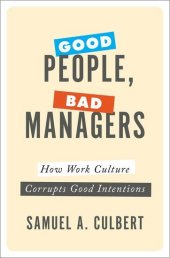 Neuerscheinungen 2017Stand: 2020-02-01 |
Schnellsuche
ISBN/Stichwort/Autor
|
Herderstra▀e 10
10625 Berlin
Tel.: 030 315 714 16
Fax 030 315 714 14
info@buchspektrum.de |

Samuel A. Culbert
Good People, Bad Managers
How Work Culture Corrupts Good Intentions
2017. 208 S. 223 mm
Verlag/Jahr: OXFORD UNIVERSITY PRESS; OUP USA 2017
ISBN: 0-19-065239-X (019065239X)
Neue ISBN: 978-0-19-065239-5 (9780190652395)
Preis und Lieferzeit: Bitte klicken
Modern organizations are rife with well-intentioned managers who follow the tenets of mainstream work culture and yet perpetuate patterns of poor management - sapping morale, well-being, and the performance of individuals and organizations. In Good People, Bad Managers, author Samuel A. Culbert explains how to shift managers┤ mindsets and to encourage them to break from the culturally written "good management" scripts they enact - to conduct themselves more
intelligently, other-sensibly, and, as opportunities arise, to contribute to the common good. Good People, Bad Managers teaches leaders what they gain from removing barriers to allowing employees their own voices, and how they, along with everyone in their company, can benefit from managers
evolving.
What┤s worse than a bad manager who everybody knows is bad? A bad manager who is well-intentioned and considered to be good. Yet these well-intentioned bad managers make up the bulk of management today. How did that happen? How did so many of today┤s managers end up with a self-preservation mindset that doesn┤t always translate to a productive and mission-oriented environment? How did so many good people become wedded to a work culture that saps morale, well-being
and performance at both the individual and organizational levels?
an the well-intentioned doling it out realize... and even In Good People, Bad Managers: How Work Culture Corrupts Good Intentions, author Samuel A. Culbert sheds a light on the bad habits that are routinely followed by these well-intended managers. Managers need to understand the causes of their misguided practices. They need to become more aware of the damage they inflict, and the hollowness of the rationales they use to justify what they do. Company leaders, CEOs, and top-tier
managers must become aware of how they have gone astray as a first step in implementing the truly beneficial management mentality that their companies, their managers and their employees require to succeed.
Addresses a relevant, significant problem: management culture is rife with deception. Regardless of one┤s level within a firm, all managers make subjective decisions, protect their own turf (i.e., pursue departmental goals at the expense of corporate goals), and do not treat all employees fairly as they have biases. This book is strong, in a practical sense, in that real-world examples are explored and approaches for improving the culture are given. Additionally, soft management skills (communication and psychology) are promoted in this text. Undoubtedly, managers who are able to better understand how they make decisions and improve their communication with employees will make better managers. Personnel Psychology
Samuel A. Culbert is an award winning author, researcher, and professor at UCLA┤s Anderson School of Management. His laboratory is the world of work where he puts conventional managerial assumptions under a microscope to uncover and replace dysfunctional practices. Widely recognized as a candid speaking expert and theoretician, he is author most recently of Get Rid of the Performance Review and Beyond Bullsh t. SmartMoney
Magazine named Beyond Bullsh t to its 2008 list of ten top reads. Dr. Culbert is winner of a McKinsey Award for an article published in the Harvard Business Review, is a frequent contributor to management journals, and has authored numerous chapters in leading management books. His other authored and co-authored books include The Organization
Trap, The Invisible War: The Pursuit of Self-Interests at Work, Radical Management, Mind-Set Management, and Don┤t Kill the Bosses!.


